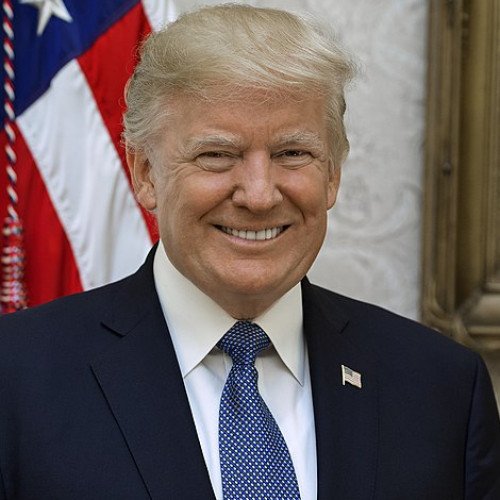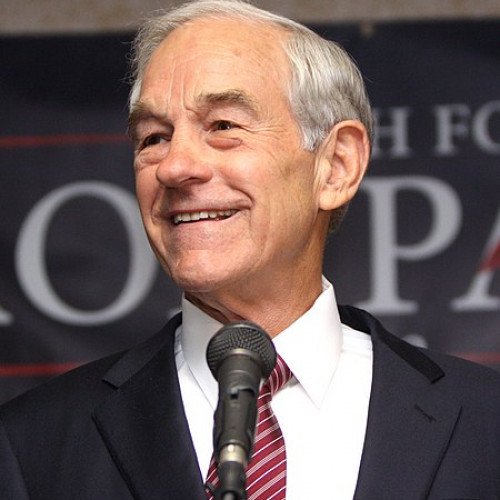Donald Trump VS Ron Paul

Donald Trump
Donald John Trump (born June 14, 1946) is an American politician who was the 45th president of the United States from 2017 to 2021. Before entering politics, he was a businessman and television personality. Born and raised in Queens, New York City, Trump attended Fordham University for two years and received a bachelor's degree in economics from the Wharton School of the University of Pennsylvania. He became the president of his father Fred Trump's real estate business in 1971, which he renamed The Trump Organization; he expanded the company's operations to building and renovating skyscrapers, hotels, casinos, and golf courses. Trump later started various side ventures, mostly by licensing his name. Trump and his businesses have been involved in more than 4,000 state and federal legal actions, including six bankruptcies. He owned the Miss Universe brand of beauty pageants from 1996 to 2015, and produced and hosted the reality television series The Apprentice from 2004 to 2015. Trump's political positions have been described as populist, protectionist, isolationist and nationalist. He entered the 2016 presidential race as a Republican and was elected in an upset victory over Democratic nominee Hillary Clinton while losing the popular vote. He became the first U.S. president without prior military or government service. His election and policies have sparked numerous protests. Trump made many false and misleading statements during his campaigns and presidency, to a degree unprecedented in American politics. Many of his comments and actions have been characterized as racially charged or racist. During his presidency, Trump ordered a travel ban on citizens from several Muslim-majority countries, citing security concerns; after legal challenges, the Supreme Court upheld the policy's third revision. He enacted a tax-cut package for individuals and businesses, rescinding the individual health insurance mandate penalty of the Affordable Care Act (ACA). He appointed Neil Gorsuch, Brett Kavanaugh and Amy Coney Barrett to the Supreme Court. He reacted slowly to the COVID-19 pandemic, downplayed the threat, ignored or contradicted many recommendations from health officials, and promoted false information about unproven treatments and the availability of testing. In foreign policy, Trump pursued an America First agenda: he renegotiated the North American Free Trade Agreement (NAFTA) as the United States–Mexico–Canada Agreement (USMCA) and withdrew the U.S. from the Trans-Pacific Partnership trade negotiations, the Paris Agreement on climate change and the Iran nuclear deal. He imposed import tariffs which triggered a trade war with China, moved the U.S. embassy in Israel to Jerusalem and withdrew U.S. troops from northern Syria. He met three times with North Korean leader Kim Jong-un, but negotiations on denuclearization eventually broke down. A special counsel investigation led by Robert Mueller found that Trump and his campaign benefited from Russian interference in the 2016 presidential election, but did not find sufficient evidence to press charges of criminal conspiracy or coordination with Russia. Mueller also investigated Trump for obstruction of justice and his report neither indicted nor exonerated Trump on that offense. Trump later pardoned five people who were convicted as a result of the Russia investigation. After Trump solicited Ukraine to investigate his political rival Joe Biden, the House of Representatives impeached him in December 2019 for abuse of power and obstruction of Congress. The Senate, after refusing to hear witness testimony, acquitted him of both charges in February 2020. Trump lost the 2020 presidential election to Biden but refused to concede defeat. He attempted to overturn the results by making false claims of electoral fraud, pressuring government officials, mounting dozens of unsuccessful legal challenges and obstructing the presidential transition. Hours before the ceremonial counting of the electoral votes on January 6, 2021, Trump rallied his supporters and exhorted them to march to the Capitol, which they then stormed. Five deaths resulted, and Congress was evacuated. Seven days later, the House of Representatives impeached him again, for "incitement of insurrection", making him the only American federal officeholder to be impeached twice.
Statistics for this Xoptio

Ron Paul
Ronald Ernest Paul (born August 20, 1935) is an American author, physician, and retired politician who served as the U.S. Representative for Texas's 22nd congressional district from 1976 to 1977 and again from 1979 to 1985, and for Texas's 14th congressional district from 1997 to 2013. On three occasions, he sought the presidency of the United States: as the Libertarian Party nominee in 1988 and as a candidate in the Republican primaries of 2008 and 2012. A self-described constitutionalist, Paul is a critic of the federal government's fiscal policies, especially the existence of the Federal Reserve and the tax policy, as well as the military–industrial complex, the war on drugs, and the war on terror. He has also been a vocal critic of mass surveillance policies such as the USA PATRIOT Act and the NSA surveillance programs. He was the first chairman of the conservative PAC Citizens for a Sound Economy, a free-market group focused on limited government, and has been characterized as the "intellectual godfather" of the Tea Party movement, a fiscally conservative political movement that is largely against most matters of interventionism.Paul served as a flight surgeon in the U.S. Air Force from 1963 to 1968, and worked as an obstetrician-gynecologist from the 1960s to the 1980s. He became the first Representative in history to serve concurrently with a child in Congress when his son, Rand Paul, was elected to the U.S. Senate from Kentucky in 2010. Paul is a Senior Fellow of the Mises Institute, and has published a number of books and promoted the ideas of economists of the Austrian School such as Murray Rothbard, Friedrich Hayek, and Ludwig von Mises during his political campaigns. After the popularity of his 2008 presidential bid, Paul announced in July 2011 that he would forgo seeking another term in Congress in order to focus on his 2012 bid for the presidency. Finishing in the top four with delegates in both races (while winning four states in the 2012 primaries), he refused to endorse the Republican nominations of John McCain and Mitt Romney during their respective 2008 and 2012 campaigns, and on May 14, 2012, Paul announced that he would not be competing in any other presidential primaries but that he would still compete for delegates in states where the primary elections had already been held. At both the 2008 and 2012 Republican National Conventions, Paul received the second-highest amount of delegates behind only McCain and Romney respectively. In January 2013, Paul retired from Congress but still remains active on college campuses, giving speeches promoting his libertarian vision. He also continues to provide political commentary through The Ron Paul Liberty Report, a web show he co-hosts on YouTube. Paul received one electoral vote from a Texas faithless elector in the 2016 presidential election, making him the oldest person to receive an electoral vote, as well as the second registered Libertarian presidential candidate in history to receive an Electoral College vote, after John Hospers in 1972.